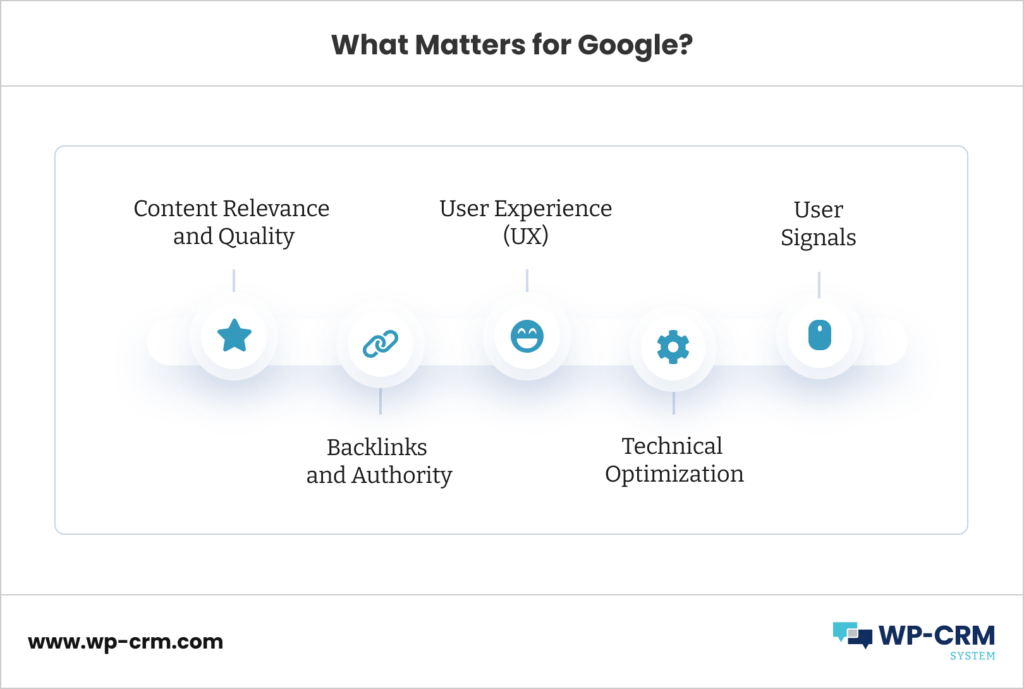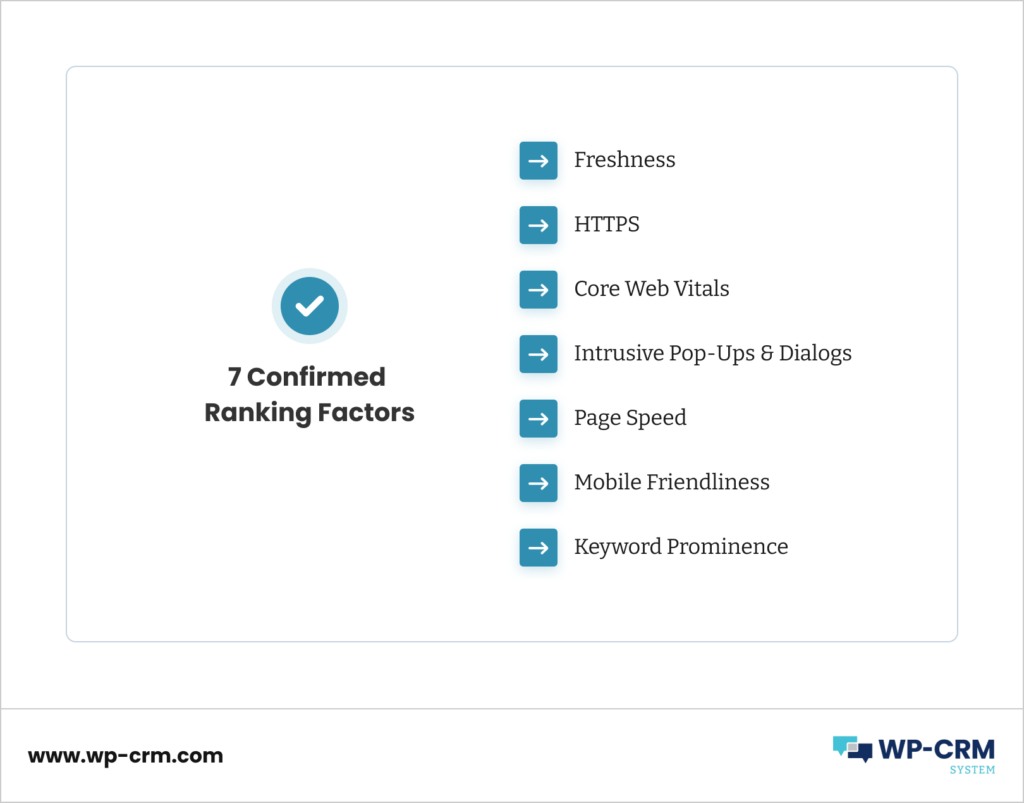Google Ranking Factors: Fact or Fiction
Google ranking factors have always been a hot topic in the marketing world. Although Matt Cutts from Google hinted about having over 200 ranking “variables” in the search engine algorithm back in 2009, we are now in 2023 and still kept in the dark about what exactly makes a site take the SERPs by storm.
And while website owners and marketers frantically try to optimize their content to please the search bots, Google shoots new updates all the time. In fact, sometimes not one, but three in a single month!
So, how do we please the Google algorithm and connect all the dots? In this guide, we will explain how to sift through the myths and speculations about what the Google ranking factors are, and how to decide what to prioritize when doing SEO of your content. Let’s go!
What Are Google Ranking Factors And How Can We Use Them?
In a nutshell, Google ranking factors are the criteria or signals used by the Google search algorithm to assess and determine the relevance, quality, and authority of web pages. They play a significant role in determining the position of a website in search engine results pages (SERPs).
What Matters for Google?

While Google does not disclose the exact details of its ranking algorithm, extensive research and analysis have provided insights into some key content characteristics that influence SERPs positioning.
- Content Relevance and Quality. Google prioritizes websites with high-quality, relevant content that satisfies user search intent. Factors such as keyword usage, topical relevance, uniqueness, depth, and user engagement metrics (such as time spent on page) impact a site’s ranking.
- Backlinks and Authority. Inbound links from reputable and authoritative websites are crucial for establishing a site’s credibility. Google considers the quality, quantity, and relevance of backlinks when determining rankings.
- User Experience (UX). Google emphasizes delivering a positive user experience, so factors like page load speed, mobile friendliness, ease of navigation, and low bounce rates contribute to higher rankings.
- Technical Optimization. Proper technical optimization of a website, including meta tags, structured data, XML sitemaps, and crawlability, helps search engines understand and index the site’s content efficiently.
- User Signals. User behavior metrics, such as click-through rate (CTR), dwell time, and bounce rate, provide insights into how users perceive and interact with a website. Positive user signals indicate relevance and value, leading to higher rankings.
Top Google Ranking Factors 2023: Sorting Fact From Fiction
Now that we have outlined the main content aspects that count for quality and meet Google SEO ranking factors halfway, let’s discuss some of the confirmed guidelines to pay attention to as opposed to the myths.
7 Confirmed Ranking Factors
While Google’s algorithm consists of numerous factors, certain elements have been confirmed to impact rankings.

- Freshness
- HTTPS
- Core Web Vitals
- Intrusive Pop-Ups & Dialogs
- Page Speed
- Mobile Friendliness
- Keyword Prominence
Freshness
The freshness of content has become increasingly important to Google, ever since the Caffeine Update in 2010. Websites that regularly update their articles with trendy, relevant information are more likely to rank higher as they would appear relevant for current search queries. This factor emphasizes the importance of consistently publishing new content, refreshing existing pages, and staying up-to-date with industry trends.
HTTPS
Secure websites that utilize Hypertext Transfer Protocol Secure (HTTPS) have an advantage in search rankings. Google prioritizes websites that provide a safe browsing experience for users. Implementing an SSL certificate to enable HTTPS encryption not only boosts SEO but also enhances user trust and data security.
Core Web Vitals
Core Web Vitals are a set of specific website performance metrics that measure the user experience. They include factors like page loading speed, interactivity, and visual stability. Optimizing Core Web Vitals can improve user satisfaction, reduce bounce rates, and potentially lead to higher rankings.
Intrusive Pop-Ups & Dialogs
Google aims to provide users with a positive browsing experience, which is why intrusive interstitials can negatively impact rankings. Pages that display annoying elements that distract users, such as full-page pop-ups that hinder content accessibility, may be penalized. It is essential to use non-intrusive methods for displaying important information or capturing user data to avoid detrimental effects on rankings.
Page Speed
The speed at which your website loads is also a ranking factor. Google wants its users to have a positive experience, and if your website takes too long to load, they are likely to click away and find another site that meets their needs. There are a number of ways to improve your page speed, such as optimizing your images and using a content delivery network (CDN).
Mobile Friendliness
As more and more people use mobile devices to access the internet, it is becoming increasingly important for websites to be mobile-friendly. Google has stated that they are now using mobile friendliness as a ranking factor, so it is important to make sure that your website is optimized for mobile users.
Keyword Prominence
Including your primary keyword in the first 100 words of a page corresponds to first-page positions on Google. So, aim to include it in the first paragraph of your articles in a natural way that makes sense in the context.
4 Popular Myths About Google Ranking Factors
In the world of SEO, various myths and misconceptions often circulate regarding Google’s ranking factors. It’s important to dispel these myths and gain a clear understanding of what truly influences search engine rankings. Here are a few popular myths that people think are Google ranking factors but aren’t:
Domain Age
Domain age can have some impact on rankings in terms of the traffic and link juice it has acquired over the past. However, it is a myth as to what extent it actually matters:
No, domain age helps nothing.
— John Mueller (official) · #StaplerLife (@JohnMu) July 5, 2019
Domain age refers to how long a domain name has been registered for. Generally speaking, older domains tend to have more authority than newer domains and may rank higher as a result. However, several other factors can influence your site’s position on SERPs, such as the quality of the content on the website and the number of backlinks pointing to the site.
Social Media Metrics
There is a belief that social media metrics, such as the number of likes, shares, or followers, directly impact search rankings. However, Google does not use social media signals as direct ranking factors. While social media can indirectly influence SEO by driving traffic and engagement, it does not directly impact rankings.
Keyword Density
The notion that using a high keyword density in your content will boost your rankings is a persistent myth. In reality, excessive keyword stuffing can harm your SEO efforts. Google’s algorithms have become more sophisticated in understanding context and relevance. Focus on creating high-quality, informative content that naturally incorporates relevant keywords.
Exact Match Domains (EMDs)
Exact match domains, where the domain name matches the targeted keyword, were once believed to provide an SEO advantage. However, Google has devalued the influence of EMDs in its algorithm. While having a relevant domain name can still be beneficial, it is not a guaranteed path to higher rankings on its own.
Bottom Line
As you can see, there is nothing that secretive about the Google ranking factors – as long as your content is secure, relevant, optimized for mobile, and is regularly updated. So, channel your efforts in helping your users with correct, in-depth information and keep educating yourself on the latest SEO trends and updates. Also, stay on top of your client communications to make sure that your marketing efforts pay off as steady, long-term conversions – check out our plugin WP-CRM today!
